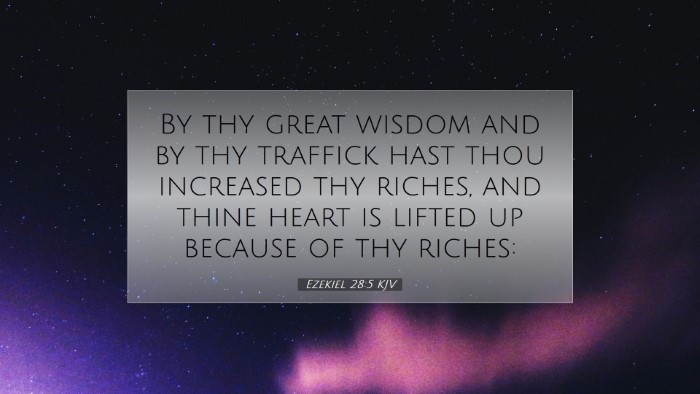Commentary on Ezekiel 28:5
Ezekiel 28:5 (KJV): "By thy great wisdom and by thy traffick hast thou increased thy riches, and thine heart is lifted up because of thy riches."
Introduction
The verse Ezekiel 28:5 is a key scripture that highlights the pride and downfall associated with wealth and wisdom, particularly for the king of Tyre. This commentary draws insights from various public domain sources to explore the implications of this verse for contemporary readers, including pastors, students, theologians, and Bible scholars.
Contextual Background
Ezekiel delivers a message of judgment against multiple nations, and specifically against Tyre and its king within chapters 26-28. The context of 28:5 is particularly focused on rebuke, illustrating how earthly wisdom and material success can lead to spiritual downfall.
Insights from Commentators
Matthew Henry
“By thy great wisdom and by thy traffick hast thou increased thy riches.” Henry emphasizes that the king of Tyre is depicted as a merchant prince whose prosperity is derived from his exceptional acumen and trade activities. However, this prosperity is a source of pride that ultimately leads to his destruction. Henry reflects on the lesson that worldly wisdom can lead to folly if it is divorced from humbleness before God.
Albert Barnes
Barnes notes that the 'wisdom' celebrated in this passage relates to both practical intelligence and cunning that can increase wealth but is never a guarantee for God's favor. He highlights how the king's arrogance, fostered by his riches, serves as a cautionary tale for leaders, warning against becoming self-sufficient and neglecting their dependency upon divine grace.
Adam Clarke
Clarke's exposition notes that the phrase “thou hast increased thy riches” illustrates the success in trade and commerce that the king of Tyre enjoyed. However, he warns that the king's increasing wealth led to a heart filled with pride ("thine heart is lifted up"). Clarke underscores that such pride, a common pitfall among those who gain material wealth, becomes a barrier to spiritual awareness, prompting a fall from grace.
Theological Implications
- Wealth and Wisdom: The relationship between wealth and wisdom is complex; while they can elevate one's status, they also carry the potential for arrogance and a distorted view of self-reliance.
- Pride Goeth Before a Fall: The principle of pride leading to downfall is a recurring theme in scripture, urging believers to remain humble and acknowledge their dependence on God.
- The Limitations of Earthly Success: The passage serves as a reminder that earthly achievements are fleeting and can lead individuals away from their spiritual responsibilities and relationship with God.
Application for Today
For pastors and church leaders, Ezekiel 28:5 offers valuable lessons about humility in leadership — it serves as a reminder to maintain spiritual integrity amidst success. For students and scholars, it provokes thought on the nature of wisdom and its application in contemporary contexts. Engaging with this scripture forces a consideration of how individual and communal identities are wrapped up in material success and the accompanying dangers.
Conclusion
Ezekiel 28:5 stands as a profound warning about the intersection of wisdom, wealth, and pride. It calls believers to reflect on their own hearts and attitudes regarding material possessions and success. The insights gathered from Matthew Henry, Albert Barnes, and Adam Clarke enrich our understanding of this verse, reminding us that true wisdom leads to humility, a reliance on God, and an acknowledgment that all we possess is a gift from Him.


